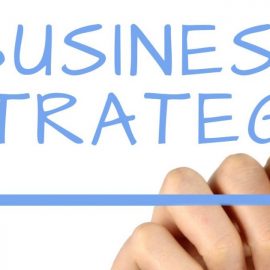

This article is an excerpt from the Shortform book guide to "The Infinite Game" by Simon Sinek. Shortform has the world's best summaries and analyses of books you should be reading.
Like this article? Sign up for a free trial here .
Why is mindset important in business? How would you describe your mindset when it comes to doing business?
According to Simon Sinek, the author of The Infinite Game, those who survive in business do so because they adopt the mindset that business is an infinite game—a constantly evolving and never-ending game with a higher purpose. Those who don’t survive are the ones who have a finite mindset—they see business as a finite game, filled with short-term concerns and aimed at a win-or-lose ending point.
Keep reading to learn about the two types of business mindset, according to motivational speaker and author Simon Sinek.
Two Mindsets: Finite and Infinite
A leader who understands she is playing an infinite game will have much greater success than one who thinks she is playing a finite game. Someone who sees the infinite game will make decisions based on long-term strategies that develop long-term strength, while a leader who plays a finite game will aim for short-term wins that might weaken her organization in the long run. Consistently, businesses that succeed over many years are run by leaders with infinite mindsets, while businesses that fail are run by leaders with finite mindsets.
There are several key differences between finite and infinite business mindsets. Each mindset reflects different attitudes and priorities towards competitive pressures. Some of these differing attitudes include:
- Winning versus playing: A finite-minded leader plays to win, while an infinite-minded leader plays to survive. Therefore, a finite-minded leader works to defeat others while an infinite-minded leader works to improve her standing among others.
- “It’s about me” versus “It’s about us”: While a finite-minded leader thinks only of herself and her company, an infinite-minded leader considers the impact her company will have on her employees, her community, the economy, and the outside world.
- Reactive versus proactive: Finite-minded players react to disruptions, while infinite-minded players anticipate them and proactively prepare for them.
- Short-term versus long-term goals: Finite-minded players tend to make decisions and set goals based on what will affect their near-term bottom line, while infinite-minded players tend to set goals that work toward a longer-term view of success. Ironically, infinite-minded companies often end up with higher profits even though they’re not focused as fixedly on their bottom line.
- Short-term threats versus long-term threats: Finite-minded leaders often focus on specific, definable threats posed by their rivals, and center their corporate strategies around responding to those threats. Infinite-minded leaders focus on exploring unknown possibilities that might strengthen their organizations (for example, innovations that might add value for their customers).
- Stability versus resilience: Finite-minded companies aim for stability and the ability to weather storms. Infinite-minded companies aim not just to weather storms but to be made stronger by them. They are resilient rather than merely stable.
Finite Thinking Leads to Short-Lived Companies
As finite thinking in boardrooms has increased over time, the lifespan of companies has decreased. In the 1950s, a company lasted 60 years on average. Today, the average company lasts less than 20 years.
By focusing exclusively on a company’s short-term profits, temporary stock prices, and immediate shareholder concerns, finite-minded thinking has led to the creation of large numbers of companies that engage in behavior that weakens them in the long run. For example, when corporations tie executive pay to short-term metrics like share price increases, those executives are more likely to close factories, suppress wages, cut corners in production quality, and lay off workers. These are all actions that might temporarily boost a stock price, but often damage the company’s ability to survive in an infinite game.
| Finite Thinking Leads to Principal-Agent Problems These types of distorted incentives are sometimes caused by the “Principal-Agent Problem,” which is the fact that the incentives of an employee (an agent) often differ from those of their employer (the principal). Essentially, an employee is incentivized to get as much as possible out of a company as quickly as possible, which can lead to behavior that works against the long-term interest of the employer. Thus, a finite-minded CEO might chase a large bonus or a high stock price by announcing, for example, a large company initiative that would get Wall Street excited but would enter the company into a field they have no expertise in—like an electronics company deciding to sell clothing as well—and that might ultimately not be sustainable. In contrast, an infinite-minded CEO would be more aligned with the long-term goals of the company (in other words, both principal and agent would be aligned). Instead of boosting the short-term stock price for their own gain, they would invest in areas that would more slowly pay off in the long run—such as the research and development of an innovative product that extends the company’s existing line even if it temporarily decreases the company’s reported profit in the short-term. |
Infinite Thinking Leads to Long-Lived Companies
On the other hand, infinite thinking creates companies that are well-equipped to survive competitive challenges and changes in the economic, technological, and political landscapes. An infinite-minded leader works for long-term success rather than short-lived victories. She ignores pressures from outside advisors who encourage her to hit immediate targets—like sales numbers or stores opened—that might spread her resources too thinly and consequently weaken her company over time, which will prevent it from ultimately overcoming challenges.
How to Lead With an Infinite Mindset
To build a strong, resilient company that’s well-positioned to ride out whatever challenges it encounters, you need to develop an infinite mindset. To do so, follow five guidelines:
Guideline 1: Advance a Just Cause
A Just Cause is a big-picture vision that provides a framework for your corporate strategies. It provides a context for all the decisions you’ll make and sets the goal your company will work toward infinitely.
Your Just Cause must be specific. It must paint a particular picture that others can envision; a promise to “improve the world” doesn’t provide enough substance or specificity to inspire people.
A Just Cause has five elements:
- It stands for something, not against something: Working against something leads to finite thinking as we focus on specific, known solutions to defined problems. Working for something makes us focus on the future and opens our eyes to alternative solutions that might bring us to our ideal state in any number of ways.
- It’s inclusive: It invites and inspires others to join a movement by attracting them to join in with other like-minded believers.
- It’s service-oriented: It’s aimed at the benefit of others.
- It’s resilient: It can endure technological, cultural, and industry changes. If your company revolves around a specific product, then your organization’s existence depends on those products staying relevant. But if your organization revolves around a Just Cause, you can stay infinitely relevant; you will be able to see how and when your products need to be adjusted in order to continue to serve that Cause.
- It’s idealistic: It’s inspiring, bold, and ultimately unachievable. Victories along the way should be celebrated as a glimpse into the future vision of the ideal state the Just Cause espouses, but the idealism of a Just Cause is never truly accomplished and finished; it should continue to inspire people to work towards it infinitely in ever-changing ways.
Guideline 2: Build Trusting Teams
To lead an organization with an infinite mindset, you must build trusting teams. A trusting team is a team made up of people who feel safe around each other: safe to express their feelings, ask for help, talk about problems, and admit to mistakes.
It is crucial to have trusting teams in an organization if it is to run smoothly. When people work on a trusting team, they know that their bosses and colleagues will support them through errors and will offer help in a non-judgmental way when asked. Conversely, when people do not work on a trusting team, they do not feel comfortable showing vulnerabilities, and they often feel compelled to lie, hide mistakes, and fake expertise rather than ask for help. In such an environment, problems in an organization are ignored or hidden instead of fixed. After some time, these problems can build up and can be much harder to address.
Balance Performance With Trust
When putting together a strong team, infinite-minded leaders must consider a candidate’s trustworthiness as well as her capabilities, and they must understand that sometimes, the best person for a job is not necessarily the highest-performing candidate. High performance is a reflection of competence, but trustworthiness is a reflection of character. It turns out that trust is often a better indicator of a quality employee—one who will contribute to the organization and elevate her colleagues, helping to make everyone do their jobs a bit better.
Focusing exclusively on performance while ignoring trust might earn an organization short-term success, but it sets it up for long-term failure. Companies that ignore the importance of trust often promote toxic, self-serving behavior and consequently end up filled with people caught up in internal competition: hoarding information, taking credit for others’ efforts, and avoiding accountability.
Guideline 3: Study Your Worthy Rivals
To develop your infinite-minded leadership, study your worthy rivals. A worthy rival is a competitor who is better than you at certain things, and who can therefore reveal to you ways you can improve, enabling you to better survive in the infinite game. They may make a better product, provide a better service, or command stronger customer loyalty than you do: anything from which you can draw lessons.
A worthy rival inspires you to act ethically: Viewing a competitor as a worthy rival rather than simply a rival can encourage ethical behavior, as it changes your perspective on competition in general. A worthy rival inspires you to improve rather than just to win, focusing your attention on process rather than outcome. Consequently, you feel less pressure to win at any cost and therefore have less incentive to cheat or bend the rules. Ford provides an example of this: When its CEO testified in front of Congress and advocated for his competitors to receive a government bailout after the financial collapse of 2008, he sought not to destroy his worthy rivals but instead to strengthen them and the industry in general.
A worthy rival helps you define yourself: When you have a worthy rival, that person or organization can help you define yourself in opposition to it. If your rival stands for certain principles and you stand for different principles, the comparison between the two of you can keep you focused on what you stand for and can also help make your principles clear to your customers.
For example, Apple saw IBM as a worthy rival when IBM entered the personal computing market in 1981. Instead of responding reactively to IBM’s products with copycat products in an attempt to steal market share, Apple positioned its own brand as fundamentally different from the IBM brand, holding different world views and different philosophies. IBM could be the predictable, reliable, corporate brand, and Apple would be the choice of non-corporate, creative types. By leaning into this contrast, Apple came to be seen as a revolutionary leader that saw computing as a way to unleash individual creative potential; they represented the future, while IBM represented the past.
Guideline 4: Be Existentially Flexible
As an infinite-minded leader you must be prepared to be flexible on a fundamental, existential level. An existential flex is a purposeful, dramatic change that a person willingly makes in order to stay true to her Just Cause. It’s a move that pushes her out of her comfort zone and carries a risk of failure but is necessary in order for her to continue to play an infinite game.
Importantly, an existential flex is not a reactive move or a move that someone makes in order to stay alive in the face of difficult challenges. Instead, it’s a move made in anticipation of a future changing climate and made with the understanding that at some point in the future, your organization will need to be positioned differently to survive.
An existential flex is a marker of an infinite mindset because it shows that a leader is able to see the potential benefits of disruptive change, rather than just the potential threats. An example of this kind of insight is Steve Jobs’s decision, in the early 1980s, to develop a graphical user interface (GUI) for Apple even though the company had already invested millions of dollars in different technology. When Jobs was shown what computers could do with GUI, he recognized it as a technology that would advance his Just Cause: empowering regular people to use computers without needing to know complex, high-level computer language. Consequently, he re-set the direction of his company even though it meant abandoning his current business model and losing money in the process. Four years later, Apple introduced the Macintosh, a computer featuring a GUI, setting the standard for personal computing ever since.
Guideline 5: Lead Courageously
Finally, to lead an organization with an infinite mindset, you must lead courageously. Leading courageously means working toward a better future, even if doing so puts your own career in jeopardy. It can be difficult to take risks that serve a long-term vision; companies and leaders face a myriad of pressures from investors, who want to see immediate shareholder returns, as well as from employees, who want to see continuous signs of a company’s health to ensure their own job security. But when a leader leads courageously, she bases her decisions not on outsider expectations but on her Just Cause.
For example, the convenience store and pharmacy CVS Health demonstrated courageous leadership when they decided, in 2014, to stop selling cigarettes. CVS’s Just Cause is “Helping people on their path to better health,” and its executives, who fully supported the Just Cause, concluded that selling cigarettes went against that mission. Wall Street analysts and industry watchers predicted that CVS would lose sales and market share, but they lost neither. Customers and employees both supported the move and rewarded the company with good press and loyalty. A year and a half after the plan was announced, CVS’s stock price had doubled.
To truly lead with an infinite mindset, your Just Cause must be more than merely words; you must act on it. Otherwise, it’s nothing but a marketing slogan. Unfortunately, there are plenty of companies that adopt lofty statements of values but do nothing to live up to them. For example, both Walgreens and Rite Aid loudly publicize their commitments to health on their websites, but neither has followed CVS’s lead and stopped selling cigarettes.
Continuously Manage Your Infinite Mind
As you look to the future and plan for your own infinite game, remember that developing an infinite mindset is not the end of the story. Having an infinite mindset is, itself, an infinite goal that you’ll need to continuously work towards. While companies are very often founded with infinite-minded visions, sometimes they stray from those paths and end up pursuing finite goals and strategies.
Overall, infinite-minded leaders know that strong companies start with strong teams and strong partnerships, and that when they model good leadership, their employees will more often than not follow their lead, resulting in a strong, resilient organization.

———End of Preview———
Like what you just read? Read the rest of the world's best book summary and analysis of Simon Sinek's "The Infinite Game" at Shortform .
Here's what you'll find in our full The Infinite Game summary :
- Why businesses who see the game as finite don't survive
- How to develop an infinite mindset that will put you and your organization on a path for long-term success
- How the purpose of business is changing






